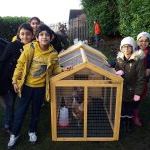Better Care Project
School children in Halifax went into local care homes for the elderly to talk to the residents and carry out tree planting and wildlife friendly gardening activities. This intergenerational approach to learning allowed the children to share their concerns about the planet, whilst learning about traditional, nature friendly gardening techniques.
Website
Food for Life Better Care Project
Useful links
Country
Media
* TOP TIP *
'Link with your local care setting and arrange a planting or cooking session with the children and residents'
How is the project linked to climate change and sustainability?
The schools worked with a local gardening project which taught them about wildlife friendly gardening and how this is better for the planet. During these sessions, the children shared what they had learnt in school about climate change and the care home residents passed on their knowledge of traditional gardening methods. The children learnt about the importance of bees as pollinators, how growing your own food can reduce food miles and how composting can help to reuce food waste and the resulting carbon emissions.
Who is involved?
Local primary schools linked with residents from a Halifax care home for the elderly. Gardening sessions were led by a local project called ‘Rooting and Fruiting’. The children and the care home residents met in the garden of the care home. They participated in a number of wildlife friendly activites such as planting native flowers to attract bees, creating a compost heap and planting fruit bushes. The project was very successful in enabling inter-generation learning between the school pupils and elderly residents. The Better Care programme also worked with other care homes to enage them with pupils around chicken keeping, growing and cooking activities.
Key steps
1. Contact your local care home to see if they are interesting in engaging with the school on an inter-generational project. Consider the number and age of the children to take part
2. Plan an activity that is suitable for both the ability of the pupils and the elderly residents. Some may struggle with mobility and access to certain areas. Plan with the care home staff so that they can help prepare and run the activity.
3. Think about what skills that children could demonstrate to the residents - perhaps they could make a little film on a tablet to show any residents not able to partipate what went on.
4. Include the opportunity to tell stories about food and growing, with elderly residents reminiscing about their youth. Perhaps a singalong or nursery rhymes to enliven the day.
5. Consider continuing the theme with cooking and food tasting ideas.



